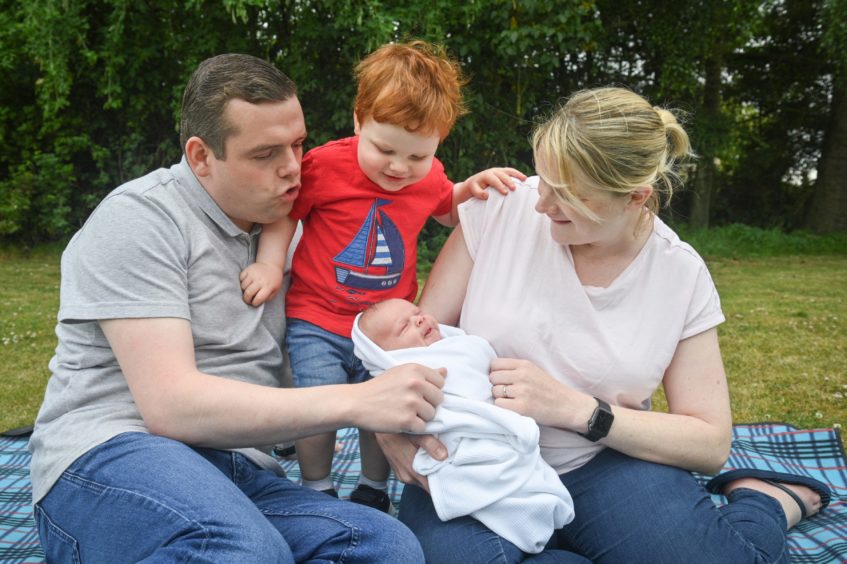Pregnant women are fearing for the lives of their unborn babies, according to powerful claims heard by Nicola Sturgeon about maternity services in Moray.
Maternity services at Dr Gray’s Hospital in Elgin were temporarily downgraded in June 2018 due to a staffing crisis, from consultant-led to midwife-led.
Most families have been since forced to drive to Aberdeen 65 miles away to give birth.
Others have been sent to even further to hospitals including Dundee and Kirkcaldy.
Scottish Conservative leader Douglas Ross raised their plight in an emotive encounter at First Minisiter’s Questions in Holyrood.
He shared the testimony of three Moray mums from a recent review into maternity services.
The Highlands and Islands MSP has first hand experience of the situation facing families in his constituency.
He was told his wife may be forced to give birth in a lay-by on the A96 while travelling to Aberdeen to give birth to their son James last year.
“I therefore thought my baby was dead and it was likely I was next.”
Testimony of one Moray mum who took part in the review
Recounting the experience of one Moray mum, Mr Ross read: “I have been told that if I had a bleed before giving birth the chances were slim that I would survive and consequently neither would my baby.
“I spent months in constant fear that I would bleed. Then the worst happened and I started bleeding at home.
“I was transferred initially to Dr Gray’s, then to Aberdeen in a blue light ambulance.
“The bleeding did initially stop and I was told my baby had a heartbeat but when the bleeding started again on the way to Aberdeen, I was told the heartbeat had gone.
“I therefore thought my baby was dead and it was likely I was next.”
Luckily mother and baby survived but the mum told the review it had taken her a year to be able to speak about her experience.
Looking visibly emotional, the first minister said “many of us, myself included, have personal experiences around baby loss at different stages”.
She added that “therefore I absolutely understand the emotion, the sensitivity and the seriousness of these issues” and that she “does not underplay the seriousness”.
The leader of the Scottish Conservatives also shared the experiences of Cara Williamson who was “transferred from Aberdeen to Kirkcaldy because of a lack of beds”.
The pregnant woman was told she “wouldn’t be allowed to go with her newborn twins” as they were transferred to the neo-natal unit at Ninewells Hospital in Dundee and she would have to wait for a separate ambulance.
Meanwhile, Billie Cowie, had to make 60-mile long journeys to Aberdeen late in her pregnancy to visit hospital, describing those journeys as “awful”.
The SNP leader said a recent review into Moray maternity services had been commissioned as part of her government’s commitment to the “reintroduction of consultant-led maternity services at Dr Gray’s in a safe and sustainable way”.
The independent review, which reported back in December, recommended that pregnant women needing emergency delivery services in Elgin should be transferred to Inverness rather than Aberdeen.
But more than a dozen clinicians have written an open letter to Health Secretary Humza Yousaf to say its findings were “unworkable and unsafe”, warning of risks of overcrowding.
Mr Ross said they have not yet had a response from the SNP minister.
Ms Sturgeon said: “The government will meet again with NHS Grampian and NHS Highland to look at practical next steps and core to that will be listening to clinicians at Raigmore in any further discussions.”
Maternity unit closures
Mr Ross said the issue does not just impact mums in Moray but that “temporary or permanent closures of maternity units” has also reduced services in Skye, Caithness, Angus and Perth.
The first minister said: “Every woman wants to be able to give birth as close to home as possible but often there are challenges and they are safety and sustainability challenges associated with that and we have to consider these issues carefully.
“For example in some of the smaller units in our country, sometimes the issue is the small number of births mean that it is not possible to have the specialisms to support some of the complexity of care that is required.
“There have also been over these years some recruitment challenges in some of these units that have added to these challenges.
“It would be completely wrong for a government or clinicians on the front line to not have regard for these very serious issues as we try to strike the right balance between quality specialist care and care as close to home as possible.”


